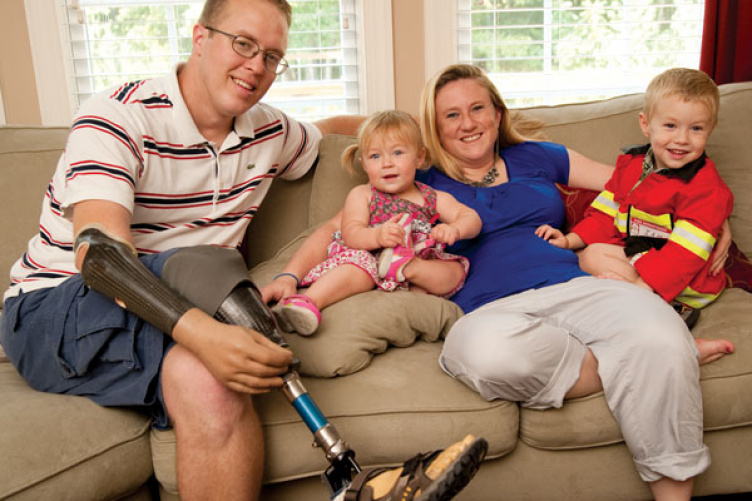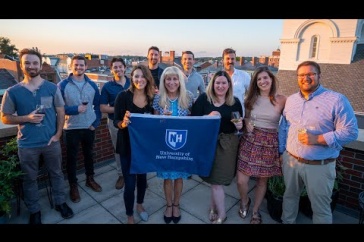
On a hot August Sunday in rural North Carolina, two former Army captains are executing a delicate mission. Their AO (area of operation) is a backyard deck piled with toys, on a quiet dead-end street set amid tobacco fields.
Dora Wilcox Quilty '03 crouches by a blue plastic wading pool, explaining to 3-year-old Ian why even big brothers have to take turns holding the hose. Scott Quilty '04 hustles out of his canvas chair as Mackenzie, 20 months, makes a beeline for the stairs. He gets there first , as always, and casually positions himself on the second step before she can tumble down. Below him on the grass, big placid Murphy, the black Lab, and small jumpy Walden, the Yorkie, wait for someone to come play on the swings.
For all that Scott and Dora Quilty did for their country in the Army, their most notable achievement may be this: Since their shared dream of a military career exploded, they have built a happy civilian life with two jobs and two kids and two dogs (and a cat and some fish), an ordinary life where they can spend a relaxed Sunday hanging out in their own backyard.
Even the best reconnaissance scout couldn't have visualized the route from UNH to this moment. The obstacles were many and major, and the toughest were not the ones most likely to catch your eye. Not the blue titanium rod standing in for Scott's right leg below the knee—the leg into which Mackenzie is clanging a yellow dump truck as she contemplates her next form of mischief. Not the arm onto which Scott hoists his daughter, the one that below the elbow becomes a black carbon-fiber sleeve and a hand that can do useful tricks when he remembers to charge the batteries.
Prosthetics are simply hardware, he says; learning to use them is just physics. The tough part is this: "When you get blown up, you lose your job."
When you get blown up. It's not a phrase Scott Quilty drops into conversations. He never wants to be the guy whose coworkers think, "Oh no, not another war story" every time he opens his mouth. But ask him about his time in Iraq, or the six years since, and the phrase creeps in. When you get blown up, life changes. When you get blown up, you replace the missing pieces and move on. He's a Ranger with a Purple Heart, Army through and through. But since an IED exploded his and Dora's plans, they have lived by the unofficial motto of the Marines: Adapt and overcome.
The 2.4 million Americans who have deployed to Iraq and Afghanistan have returned to face challenges as enormous as their numbers. Their unemployment rate, for years far higher than the rate for everyone else, finally edged down this summer—from much worse to merely equally bad. An estimated one veteran in five is dealing with a brain injury or post-traumatic stress disorder, or both. One in four has filed for some kind of disability, creating a long backlog of claims. About once every half-hour, according to the Veterans Administration, a veteran attempts suicide.
The Quiltys have seen all those problems in people they served with, people with experiences much like their own. On no day since Scott got blown up have they neglected to take stock of how lucky they are; on no day have they forgotten less fortunate friends now gone. There are a million reasons any veteran's story can go bad, Scott says. He and Dora want people to know that even after a shattered body and shattered plans, a story can also go good.
Scott Quilty enlisted during his junior year of high school in New Hampshire. Serving seemed natural; most of the men in his family had done it. Two years into his commitment, having taken college courses part time, he was accepted to UNH as a sophomore on an ROTC scholarship. He would owe the Army three years after graduation, but he intended to stay for the full 20. As Scott left Fort Bragg, N.C., in 2001, his platoon sergeant gave him this advice: Don't marry the first girl you meet.
He married the second. Growing up in Virginia, Annmarie Wilcox—usually known by her middle name, Dora—had always wanted to join the Army, like her father (an Army Ranger) and every other male on his side "all the way back to Prussia." Dora had started at UNH two years before Scott. On his first day in Durham, as he was moving into an apartment with her ROTC friends, she came over to check him out.
Originally published by:
UNH Magazine
Written by Jane Harrigan. Photography by Bryan Rierson.




















































